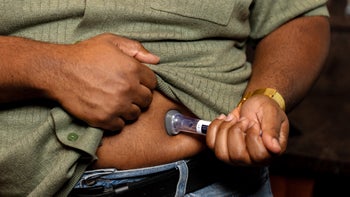
Can Coffee Help You Lose Weight? We Look Into the Evidence
Key takeaways:
Coffee can improve motivation and physical performance. This may help with weight loss by the way it impacts exercise and other health-promoting activities.
Coffee boosts metabolic rate temporarily, but it won’t create a significant calorie deficit for weight loss on its own.
A moderate amount of coffee is best. Too much coffee can disrupt sleep and blood sugar, which counteracts the potential benefits for weight loss.

Coffee consumption is at an all time high in the U.S. According to industry research, about two-thirds of people in the U.S. drink coffee every morning. And that’s not necessarily a bad thing, given it’s a rich source of antioxidants with several health benefits. But, could weight loss be one of them?
Many people reach for coffee to help them with mental focus and physical energy throughout the day. So let’s take a closer look at whether that can help with weight loss, too.
Is coffee good for weight loss?
When it comes to coffee’s direct effect on weight loss, the research is limited — and dated. So it’s difficult to draw conclusions from the data we have right now.
But here’s what we know. Some research suggests caffeine may increase metabolic rate and fat burning. It can even increase the “thermic effect” of food. This is how much energy you burn digesting and absorbing the nutrients from the foods you eat.
Higher caffeine intake has also been associated with lower weight, fat mass, and body mass index (BMI). So it’s not a stretch to assume that maybe coffee can help support your weight goals.
How does coffee help with weight loss?
Research suggests that coffee and caffeine drinkers are more likely to maintain weight loss. Coffee may help with weight maintenance and weight loss in a number of ways.
Does coffee suppress appetite? Our experts explain the research specifically on coffee and appetite.
The best ways to spruce up your coffee: What you add to your coffee could help or hurt your health and weight goals.
Should you drink coffee on an empty stomach? If you enjoy a cup of coffee first thing in the morning, there may be some benefits to that.
Appetite suppressant
The caffeine in coffee is a stimulant. For some people, this can suppress appetite. Some research finds that coffee has little effect on appetite. But other studies find that some people experience decreased appetite 30 minutes to 3 hours after drinking coffee. This may be because coffee increases fullness hormones like peptide YY and serotonin. It may also reduce hunger hormones like ghrelin.
Even though the research is mixed, it’s important not to use caffeine as a tool to stave off appetite. Delayed nourishment — especially when your body is hungry and in need of energy — can backfire. It can lead to a cycle of deprivation followed by overeating, which can be harmful to both your mental and physical health.
Metabolic rate
Stimulants like caffeine can also increase your metabolic rate — though this effect is often exaggerated. The increase in metabolism is minor compared to the benefits of a balanced diet and active lifestyle.
One 1989 study looked at how 100 mg of caffeine (from coffee) affected metabolism. Researchers found that it increases resting metabolic rate (RMR) anywhere from 3% to 4% for several hours after consuming it. Which — in context of your entire day — is not much. A 3% boost would equate to 36 to 60 extra calories burned, depending on personal RMR.
A recent research review finds that coffee consumption has a positive effect on energy expenditure, energy intake, and fat oxidation. This could make it helpful for weight loss and weight maintenance.
But there’s a little more to the story. Research studies have also found that:
Coffee had a greater effect on metabolism in leaner individuals.
Coffee consumption is associated with lower BMI and waist circumference more often in men than women.
People who increased their consumption from no coffee to having 1-7 cups/per week, had the biggest reduction in body fat.
All this is to say that coffee’s effect on metabolism is complicated and not entirely clear. In the end, you’d be better off going for a 30-minute walk — or moving your body in a way that you enjoy — than drinking a cup of coffee to burn more calories.
Increased energy and motivation
This one is based more on theory than research. But coffee may give some people more energy or motivation to do things that can help with weight loss, such as:
Exercise
Any type of physical activity
Meal prep
Cooking
Connecting with friends or your support system
Scheduling or completing tasks, which can also lower stress level
General health maintenance
Caffeine has also been shown to improve exercise performance, which could help you get more out of your movement routine.
How much coffee should you drink every day?
Coffee — and caffeine — affects everyone differently. So it may take some experimentation to figure out the right amount for you.
If you’re wondering where to start, aim for 1 to 2 cups per day (100 mg to 200 mg). That way, you are more likely to get the benefits of an energy and/or metabolic boost without any of the negative side effects.
It’s important to not overdo it. The maximum amount of caffeine recommended per day is 400 mg. Your average cup of coffee is around 95 mg of caffeine. But, this can vary. Some coffee drinks can have 150 mg to 200 mg per drink.
Pay attention to how you feel after you have a cup of coffee. It might be a sign to cut back if you start to feel anxious, jittery, or notice you begin to skip meals.
What is the best time to drink coffee for weight loss?
The best time to drink coffee really depends on your personal preference and response to caffeine. But according to science, the best time to drink coffee is midmorning.
When you first wake up, your body has a natural spike of cortisol. This helps you transition from sleep to wakefulness. So delaying your morning coffee may help you sustain that natural boost in energy.
But try to avoid having coffee too late in the day, or else it can disrupt our sleep. And poor sleep can affect your metabolism. So you don’t want to counteract coffee’s benefits, especially if you’re working toward weight loss.
Does coffee ever lead to weight gain?
It’s unlikely that coffee itself would cause you to gain weight. However, the way you drink it could potentially play a role in weight gain.
Whether you make your coffee at home or buy it at the store, it’s important to pay attention to what you (or someone else) add to it. If you’re trying to be mindful of your diet or weight, try to limit the following additions:
Added sugar: Double check the sugar content in your coffee. If you want a little boost of sweetness, use 1 tsp to 2 tsp of sugar at most. If you add pumps of syrup, this is equal to 1-2 pumps. (Note that many coffee shops add 4-6 pumps in a standard drink.)
Artificial sweeteners: Artificial sweeteners can add sweetness to your coffee, without the extra calories and sugar. But some are actually linked to increased blood sugar and disrupted gut bacteria. Natural sweeteners that don’t raise blood sugar, like stevia and monk fruit, may be a good place to start.
Creamer: If you enjoy a creamier coffee, go for one with simple ingredients. A splash of whole milk or half-and-half can go a long way to make your coffee feel like a treat.
The bottom line
Coffee has several health benefits — including some that may be helpful for weight loss. There’s research to suggest it may help with appetite, energy, and calorie burn. But it’s probably best not to use it as a weight-loss strategy. So don’t feel the need to start drinking it if you’re trying to lose weight. If you enjoy coffee as part of your daily routine, you should continue to do so. Just be mindful of what you add to it, and when you drink it.
Why trust our experts?


References
Acheson, K. J., et al. (1980). Caffeine and coffee: Their influence on metabolic rate and substrate utilization in normal weight and obese individuals. The American Journal of Clinical Nutrition.
Azmi, N. A. S. M., et al. (2021). Cortisol on circadian rhythm and its effect on cardiovascular system. International Journal of Environmental Research and Public Health.
Dulloo, A. G., et al. (1989). Normal caffeine consumption: Influence on thermogenesis and daily energy expenditure in lean and postobese human volunteers. The American Journal of Clinical Nutrition.
Guest, N. S., et al. (2021). International society of sports nutrition position stand: Caffeine and exercise performance. Journal of the International Society of Sports Nutrition.
Harpaz, E., et al. (2016). The effect of caffeine on energy balance. Journal of Basic and Clinical Physiology and Pharmacology.
Henn, M., et al. (2023). Increase from low to moderate, but not high, caffeinated coffee consumption is associated with favorable changes in body fat. Clinical Nutrition.
Icken, D., et al. (2015). Caffeine intake is related to successful weight loss maintenance. European Journal of Clinical Nutrition.
Lee, A., et al. (2019). Coffee intake and obesity: A meta-analysis. Nutrition.
National Coffee Association. (2024). Daily coffee consumption at 20-year high, up nearly 40%.

























